Meet the 2023 Academic Staff Excellence Award Winners
Each year, the University of Wisconsin–Madison recognizes outstanding academic staff members who have excelled in leadership, public service, research and teaching. They bring the university’s mission to life and ensure that the Wisconsin Idea extends far beyond the campus and the state. The following eight employees are recipients of 2023 Academic Staff Excellence Awards.
Chancellor’s Hilldale Award for Excellence in Teaching
Johanna Oosterwyk
Teaching, Learning and Technology Manager, Department of Horticulture
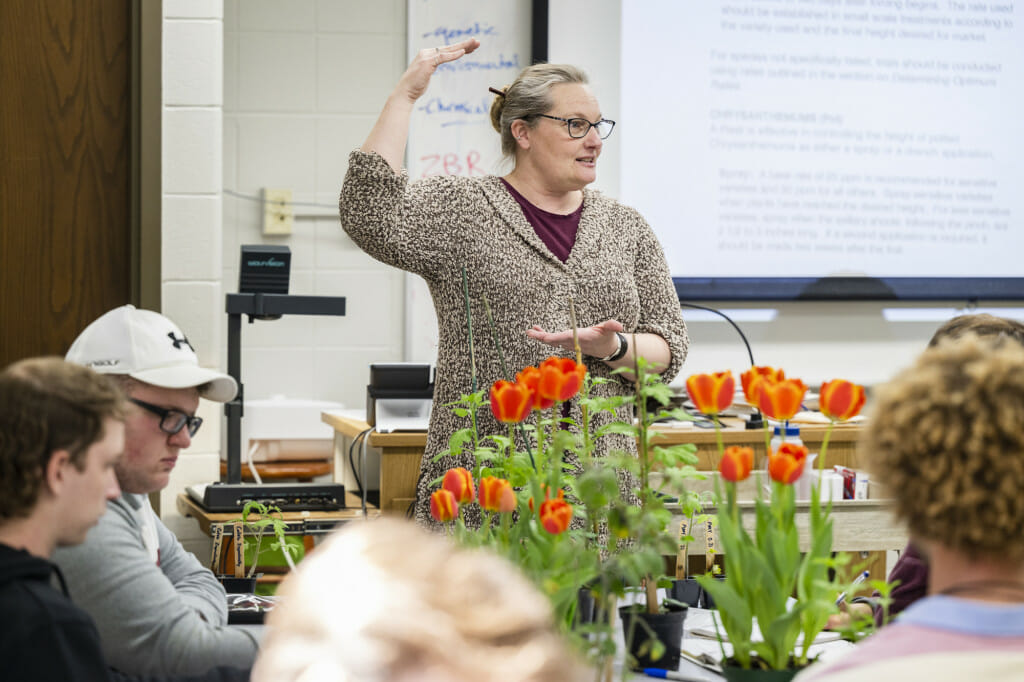
Johanna Oosterwyk teaches a class and cultivation lab in the horticulture building. Photo: Jeff Miller
When the COVID-19 pandemic hit in 2020, horticulture instructor Johanna Oosterwyk deftly pivoted. She recorded weekly videos so that her students could see the growth of the campus crops they’d normally be tending, and she sent them plant materials so they could conduct experiments at home.
It’s just one example of Oosterwyk’s heralded teaching style: creative, engaging, empathetic, welcoming. “If it were possible, she would teach all of the horticulture classes!” one student enthuses. (Oosterwyk routinely garners five-star evaluations.)
Oosterwyk adapts content to match emerging horticultural trends. When students expressed increased interest in food crops, Oosterwyk developed Horticulture 333: Survey of Controlled Environment Food Production, an introduction and broad overview of the indoor cultivation of food crops. It’s one of several courses she’s created.
Oosterwyk is known as an energetic and generous guest lecturer and an expert at connecting learning with outreach — students in one course sow seeds and tend plants that are provided to community partners. As manager of the D.C. Smith Greenhouse, Oosterwyk masterfully coordinates requests for space, optimizing the use of a key campus asset.
“Johanna makes sure students have fun while effortlessly intertwining technology, innovation and theory in a way that forces them to think outside the box.”
— Calli Anibas, research specialist and assistant, Department of Agronomy
Chancellor’s Award for Excellence in Service to the University
Desiree Bates
Computational Chemistry Leader, Department of Chemistry
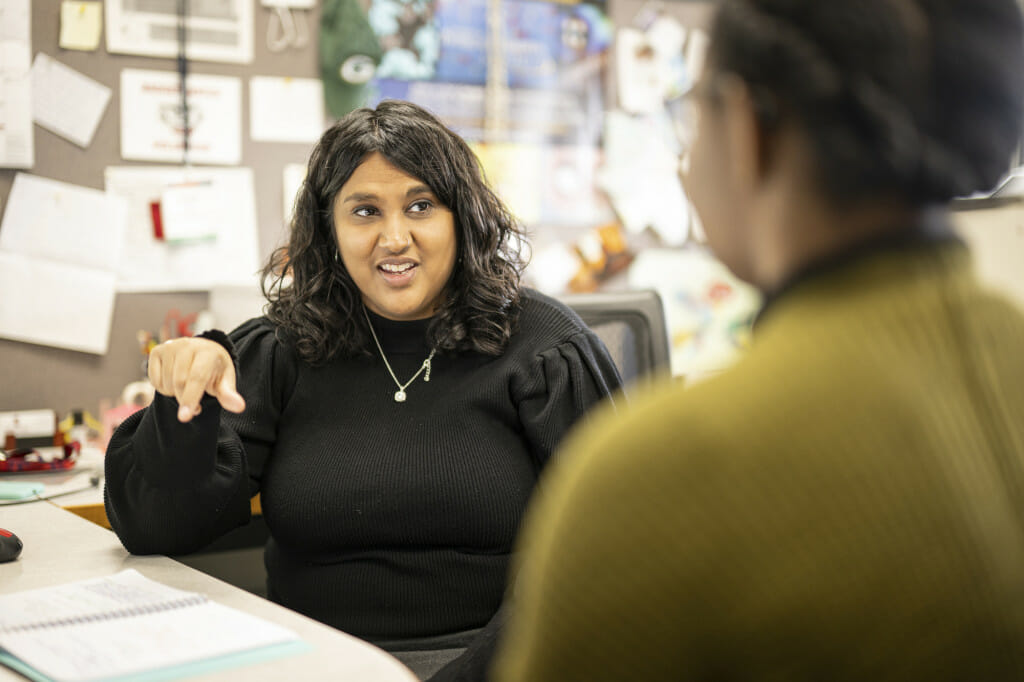
Desiree Bates speaks with students during a check-in meeting in her office in the Chemistry Building. Photo: Bryce Richter
In her primary role in the Department of Chemistry, Desiree Bates earns high praise as a computational chemist whose expertise strengthens research projects. Yet her contributions extend far beyond her job description. Colleagues say few have done more to increase the number of students from underrepresented backgrounds in the department and more broadly at the university.
Bates co-directs the Chemistry Opportunities program (CHOPs), an all-expenses paid weekend that introduces highly qualified students from underrepresented groups to the doctoral program. It has significantly increased the number of underrepresented students in chemistry — and led to increases in other STEM doctoral programs.
Once enrolled, underrepresented students benefit from Catalyst, a graduate student peer-mentoring program co-created by Bates. She helped secure national funding for a pathbreaking “Bridge to PhD” program, and she’s upped the university’s recruiting game at national meetings attended by large numbers of underrepresented students, aiding many university departments.
Bates works to build strong relationships with students, often welcoming them to her home for family meals or inviting them to join her at sports events and campus activities.
“Dr. Bates has consistently gone beyond her primary position and demonstrated a sustained and effective commitment to increasing diversity and inclusion in our department and the wider university community.”
— Mark Ediger, Hyuk Yu Professor of Chemistry, Department of Chemistry
Chancellor’s Award for Excellence in Research: Critical Research Support
Aaron M. Dingle
Senior Scientist/Scientist III, Department of Surgery
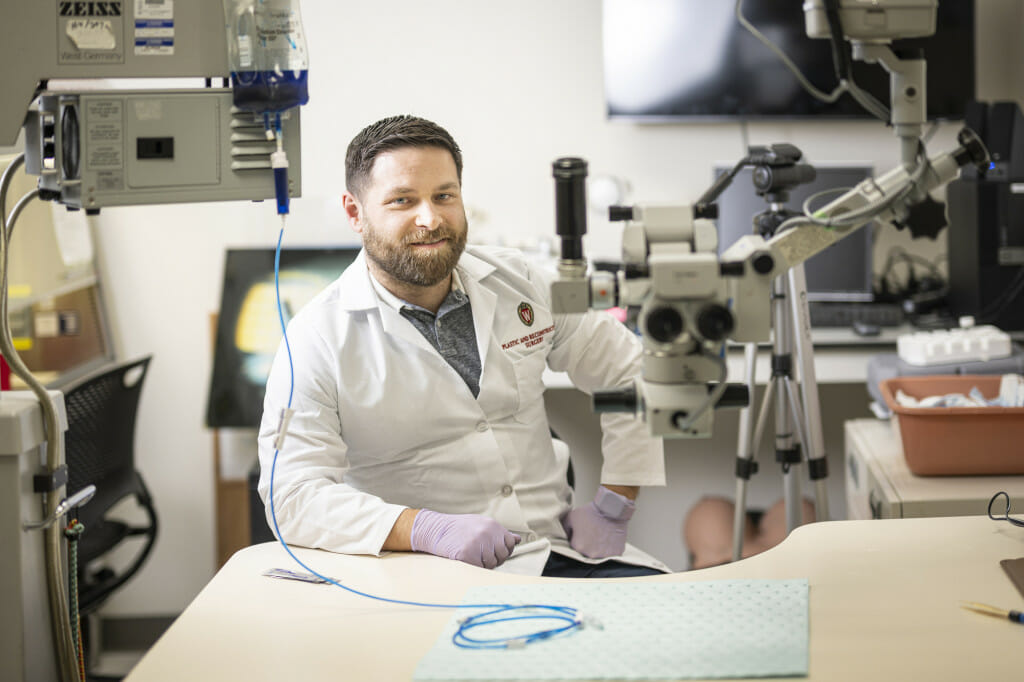
Aaron Dingle is pictured in a lab in the Wisconsin Institute for Medical Research. Photo: Bryce Richter
As co-director of the Microsurgery and Regenerative Medicine Laboratory, Aaron Dingle is known for a host of remarkable skills: innovative researcher, talented collaborator, gifted mentor and exceptionally successful grant-writer.
Since joining UW in 2015, Dingle has earned over $5M of grant support as a principal investigator or co-investigator, with the variety of funding sources as impressive as the amounts. Colleagues directly attribute the success of a grant program from the Defense Advanced Research Projects Agency to Dingle’s ability to synthesize the team’s ideas into a winning proposal. He’s translated his personal grant-writing success into a seminar, creating a multiplier effect across campus.
Dingle’s research as a PhD student focused on liver vascular tissue engineering. At UW, he’s become a skilled biomedical scientist who successfully collaborates across many fields, advancing the body of knowledge in microsurgery, bioelectric medicine and neural interfacing of prostheses. To date, he has published more than 35 peer-reviewed manuscripts.
He balances all this, one nominator writes, with “a down-to-earth humility that makes almost anyone comfortable talking science with him.”
“Dr. Dingle’s efforts have unquestionably moved the fields of microsurgery and regenerative medicine forward and have enhanced the reputation of our department and the university as a whole.”
— Rebecca Minter, A.R. Curreri Professor and Chair, Department of Surgery
Chancellor’s Award for Excellence in Research: Critical Research Support
Carol Lynn Roan
Study Director, Wisconsin Longitudinal Study, Social Science Research Services
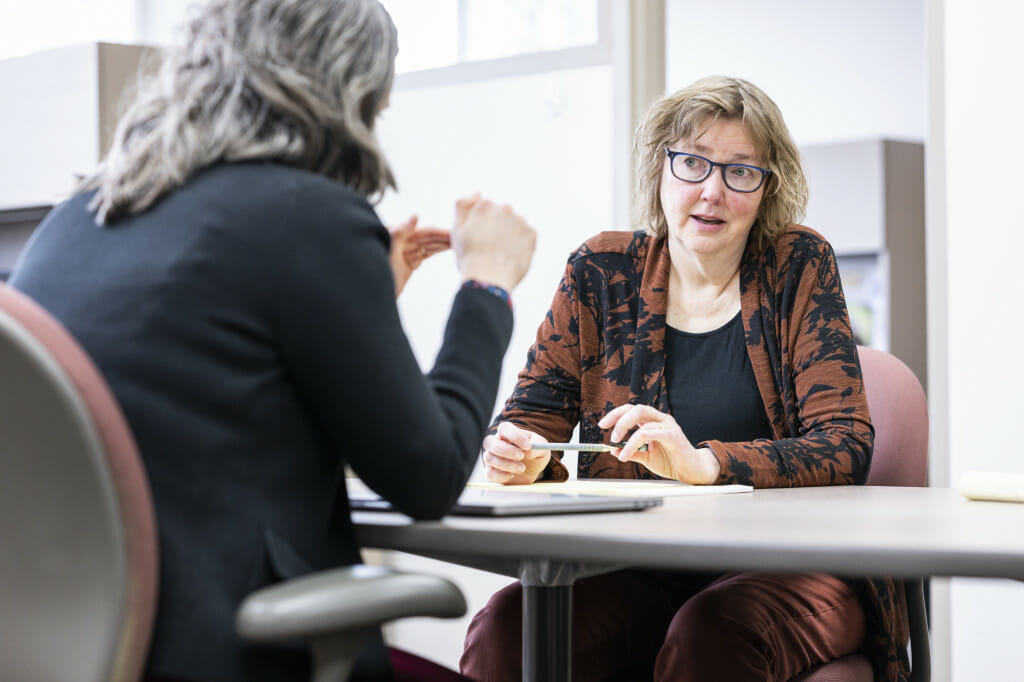
Carol Roan (right) discusses the Wisconsin Longitudinal Study with Professor Michal Engelman during a meeting in Sewell Social Sciences. Photo: Jeff Miller
Carol Roan’s work is central to the ongoing success and excellent reputation of the landmark Wisconsin Longitudinal Study, the longest and most comprehensive population-based cohort study in the United States.
For 18 years, Roan has provided critical research support for the study, which tracks the health and well-being of a random sample of 10,317 individuals who graduated from Wisconsin high schools in 1957. As study director, she is indispensable to both its daily operations and strategic direction.
Roan’s methodological and practical contributions often have been groundbreaking. She guided an extensive team for the study’s first-ever round of in-person interviews, and she continues to enrich and expand an innovative partnership with the Wisconsin Alzheimer’s Disease Research Center. Her warm and robust personal interactions with participants earn her widespread credit for one of the study’s distinguishing hallmarks: its extraordinarily high response and retention rates.
With Roan’s leadership, the study has given rise to a broad and deep literature. The scientific impact has been enormous: thousands of scholarly articles and over three decades of federal grant support.
“Carol’s many impactful contributions are truly emblematic of the Wisconsin Idea. They continue to make possible the advancement of knowledge and the service to humankind that result from the Wisconsin Longitudinal Study.”
— Michal Engelman, Principal Investigator, Wisconsin Longitudinal Study, Associate Professor of Sociology
Chancellor’s Award for Excellence in Leadership: Individual Unit Level
Dianna L. Murphy
Director, Language Institute
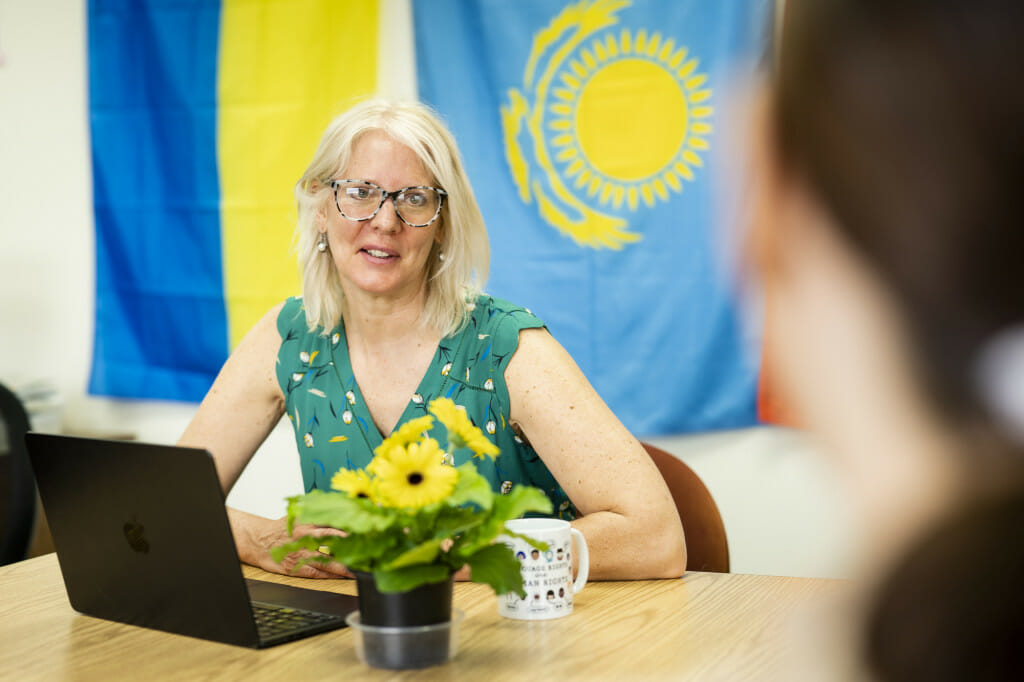
Dianna Murphy talks with a co-worker in her office in Van Hise Hall. Photo: Bryce Richter
UW–Madison is renowned for its breadth of language offerings and the brilliance of its related research initiatives and programs. Many credit the university’s small but mighty Language Institute — and particularly Dianna Murphy — as a key reason.
The institute stretches a net across campus that drives inter-departmental collaboration and excellence. Murphy, the institute’s founding associate director in 2004 and director since 2018, leads this effort with a clear sense of purpose and inclusive and innovative thinking.
Her skill as co-director of the Russian Flagship program — one of only a few like it in the country —has drawn national recognition and helped secure $1.3M in federal renewal funding in 2020. She draws special praise for her enormous personal investment in the Doctoral Program in Second Language Acquisition — on multiple occasions, she has even stepped in to fill personnel gaps.
A highly respected researcher and administrator, Murphy has devoted countless hours to campus and statewide initiatives, including adroitly helming the steering committee for The Wisconsin Language Roadmap project.
“Dianna’s leadership follows from an exceptional record as an innovative, attentive and collaborative researcher who truly works in the service of global communication.”
— Monika Chavez, Griebsch Bascom Professor of German, Director, Doctoral Program in Second Language Acquisition
Chancellor’s Award for Excellence in Leadership: School, College, or Larger University Level
Alissa Ewer
Assistant Dean for Professional Development and Communication, Graduate School
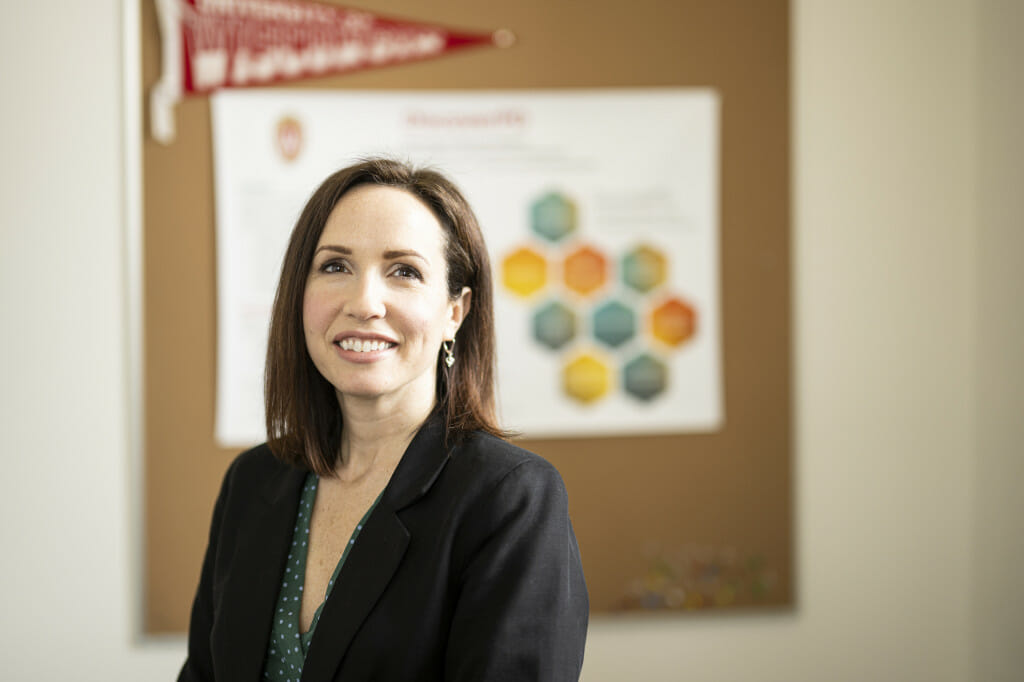
Alissa Ewer is shown in her office in Bascom Hall. Photo: Bryce Richter
A creative and collaborative leader, Alissa Ewer is a prime reason the needs and expectations of UW–Madison’s graduate students — more than 20% of the campus — are not just met but exceeded.
Ewer has reconceptualized and vastly enhanced the Graduate School’s professional development infrastructure. In one striking example, she engaged students, faculty and staff to create a new resource called DiscoverPD. The interactive online tool assesses the user’s skills, then returns campus-wide professional development opportunities from a curated database. It’s been recognized nationally by peers in graduate education.
Ewer oversees a large portfolio of communication tools that provide graduate students with tailored information in the forms most useful to them, such as the popular “GradConnections Weekly” newsletter, which she developed with her team. She’s been involved in several campus-wide efforts to highlight the accomplishments of graduate students, including “Three Minute Thesis.”
Ewer is recognized as an engaged and knowledgeable member of the profession nationally and currently is serving a three-year term on the Academic Staff Executive Committee, an important campus leadership body.
“In multiple areas, Alissa has demonstrated exceptional organizational leadership, notably enhancing the capacities and the reach of the Graduate School and by extension the university.”
— William Karpus, Dean, Graduate School; Professor of Pathology and Laboratory Medicine
Robert and Carroll Heideman Award for Excellence in Public Service and Outreach
Amy Williamson
Associate Director, UW Collaborative for Reproductive Equity (CORE)
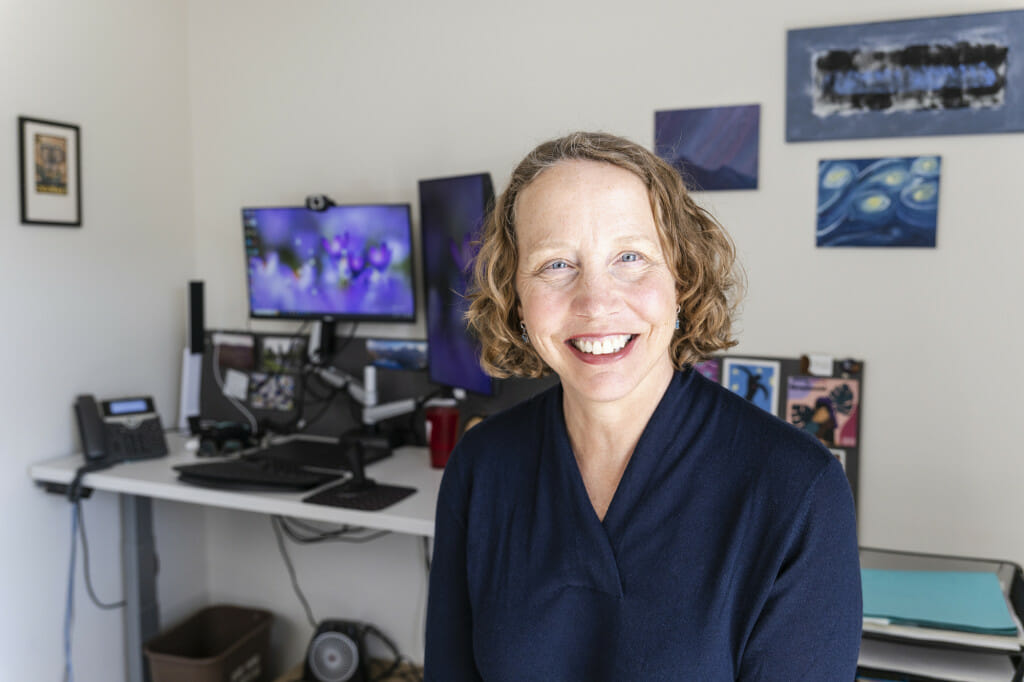
Amy Williamson is pictured in her office in the Medical Sciences Center. Photo: Jeff Miller
When the U.S. Supreme Court overturned Roe v. Wade in 2022, Amy Williamson’s efforts on behalf of the Wisconsin Idea kicked into high gear.
She went above and beyond in providing the public with clear, factual, research-based information on abortion, contraception and reproductive autonomy. As one nominee put it, “While Amy has been long deserving of this award, she has never been more deserving than during this past year.”
For policy makers and healthcare workers, Williamson prepared “Wisconsin Abortion Laws 101,” lucidly explaining the state’s complicated abortion restrictions. She has produced many evidence-based policy briefs (such as Roe v. Wade‘s Fall: Consequences for Wisconsin) and serves on statewide reproductive health workgroups, all while overseeing CORE’s day-to-day operations and its deep portfolio of research projects.
Williamson also works closely with faculty from across campus and the UW System to help translate and disseminate their research. And she does it all with what colleagues call her “special sauce” — warmth, a can-do attitude and a service mindset.
“Amy brilliantly embodies the public mission of our university, beautifully and powerfully translating CORE’s research and expertise in service to the state.”
— Jenny Higgins, Bissell Professor of Reproductive Health, Rights and Justice, Department of Obstetrics and Gynecology
Martha Casey Award for Dedication to Excellence
Bill L. Kreamer
Facilities and Equipment Specialist, Waisman Biomanufacturing, Waisman Center
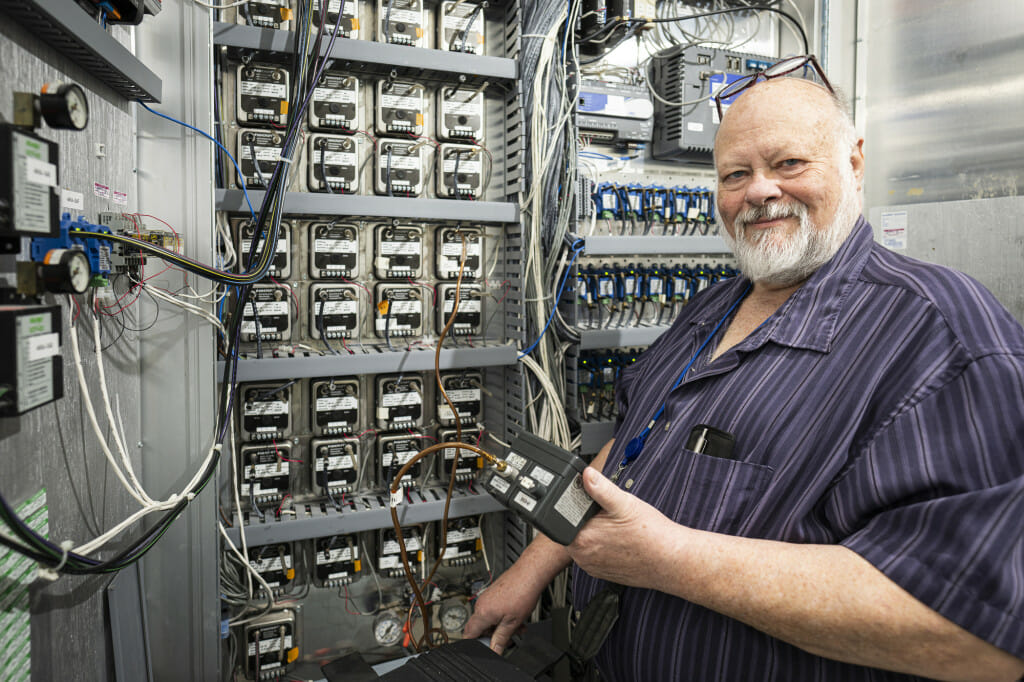
Bill Kreamer performs a maintenance check on equipment in the Waisman Biomanufacturing facility. Photo: Bryce Richter
Waisman Biomanufacturing produces biologics for use in early phase clinical trials. For more than 20 years, Bill Kreamer has played a crucial role in this intricate process.
The scope of his work includes hiring and training student employees, maintaining and calibrating equipment, and researching and implementing improvements to the facility. His devotion to the job is exemplary. He’s often the first one on the scene to solve a building or equipment problem — at any time of day or night.
Yet this is only part of his campus legacy. With a UW–Madison resume spanning many roles and more than 45 years, Kreamer is a distinguished career researcher who has played an instrumental role in a broad range of research, leading to a significant number of publications and patents.
His breadth of expertise spurs people to seek his assistance, and his deep knowledge and institutional memory contribute to the smooth operation of many labs. Raves one colleague: “In short, Bill gets stuff done, and as a result, he ensures that UW labs also get stuff done!”
“I have never encountered an individual with such commitment and dedication. Bill demonstrates an attitude of servanthood that is extremely rare.”
— Christopher Bartley, Managing Director, Waisman Biomanufacturing
Tags: academic staff, awards, staff awards




